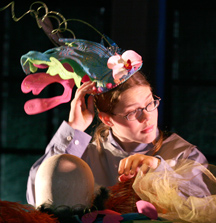 Undertaking a production of two Caryl Churchill plays has been more difficult than usual for the Wabash College Theater Department.
Undertaking a production of two Caryl Churchill plays has been more difficult than usual for the Wabash College Theater Department.
But the effort’s been worth it, as department chair Prof. Michael Abbott believes the plays will challenge central Indiana audiences with its content and non-traditional methods.
"Churchill at Eight: Two Plays by Caryl Churchill" will be performed today through Saturday in the Experimental Theater, located in the Fine Arts Center on campus. Shows begins 8 p.m. each evening. For tickets e-mail the center’s box office at boxoffice@wabash.edu. Box office hours are 8:30 a.m.-12 p.m. and 1:30-4 p.m. Monday-Friday. It opens 90 minutes before curtain time for theater events. Tickets not claimed 10 minutes before curtain are released to the general public.
Churchill has been a highly-regarded playwright in England and Europe for the past 30 years. American audiences are less familiar with her work, something the Wabash Theater Department, for its part, is trying to change.
"The big impact she’s had on drama has been she’s a very social, very political writer who tends to pay attention very closely to what’s going on in the world," Abbott said. "Her plays reflect those kinds of issues. But she’s not what you’d call a polemical writer either. She doesn’t seem to be arguing a certain case. She sees a terrific amount of complexity in the world."
The two Churchill plays Wabash is performing are "Far Away" (2000) and "A Number" (2002). While Abbott doesn’t see overtly political statements in either, he does think they’ll take audiences out of their comfort zones.
"Far Away" in some ways, is about this increasingly global conflict we all seem to be engaged in, and this idea we have to pick sides in this apparently never-ending war, however you define what that war is," he said. "She sees it in pretty stark terms. With the other, It’s essentially a play about human cloning and the responsibilities human beings must take for what they decide to do. Everything has ramifications. It’s human beings that are impacted. Those are issues we don’t tend to see and aren’t dealt with in meaningful ways where we live right now. It’s not a traditional story that looks like a television show."
Abbott sees such statements as vastly important to art.
"Even plays that aren’t presented by their playwrights as political often have a significant political dimension," he said. "It’s just a piece of the big puzzle. You wouldn’t necessarily want every playwright writing very particularly about social problems or political issues that may polarize people. But I would hate to think of art without that dimension as well."
Besides the message, Churchill’s plays are unusual in other aspects. Chief among them is the dialogue. Abbott describes it as a sort of "fractured, disrupted kind of deconstructed version of language. When you look at it on the page, it almost looks like it doesn’t make sense. But when you speak it, it actually sounds like the way people talk."
Abbott, who has an acting role in one of the plays, said It’s been tough learning his lines.
"When characters don’t speak in complete thoughts, that can be a little hard to track for an actor," he said. "It’s been a while since I’ve acted on stage. We occasionally do this to get back in the trenches with the students, if you will. Not having to memorize lines for a few years, this was probably not a good one to start with. But It’s been fine. We got there. We’re ready. But It’s been a bit of an uphill climb."
In other ways, too. One of the actors, Sterling Carter, broke his leg during pre-production and rehearsals. Perhaps just an accident. But Abbott finds the timing uncanny.
"There’s an old legend that you should never say the word ‘Macbeth‚’ in a theater," he said. "It’s considered very bad luck. There’s a long history of horrible events that’s occurred when people utter the word ‘Macbeth‚’ on a stage when It’s not being performed. People in the theater tend to just call it the Scottish play. I’ll be darned if (Wabash) didn’t bring in The Acting Company, which is a major touring company, and they were doing "Macbeth." We were in the theater and somebody mentioned it. It wasn’t more than 48 hours that one of my actors broke his leg. Probably coincidence, but people tend to chalk it up to another "Macbeth‚" curse."
But overall work on "Churchill at Eight" has gone well. Abbott is pleased with the acting Sarah Warner and Alix Hudson, daughters of Wabash faculty members, have contributed. Also unusual about this production is the fact a student is serving as co-director. Senior Donald Claxon was given the honor, something bestowed on the student body only once or twice in the past several years.
"(Claxon has) had a pretty extraordinary career here at Wabash," Abbott, who’s co-directing with him, said. "He’s done virtually everything we have to offer. He’s devoted himself to the theater and to his career path in theater in as complete a way as I’ve ever seen a student do. The one experience he hadn’t had was directing. I felt it would be useful for him going on to graduate school to have had this experience. He works very well with people. People like him because He’s so pleasant to work with and he cares about people. He wants people to succeed. He challenges you but he doesn’t make you feel like He’s judging you every second. It’s been a rare opportunity for him, and He’s made the most of it."
Alix Hudson, a junior at Crawfordsville High School, is pictured at top.
Wade Coggeshall is the Wabash College beat writer for the Journal Review